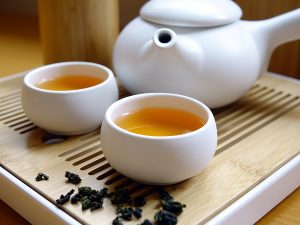Here we are going to discuss the health benefits of Oolong tea and why you should introduce Oolong tea into your daily diet. What if Gildshire told you that there is a drink that might be good for your heart, your eyes, and your teeth? What if we further said that it is readily available and served at your favorite restaurants? While Oolong tea represents only a small percentage (about 2.1% in 2019) of the world’s tea, it is worth discovering.
What is Oolong Tea?
Oolong tea is a traditional Chinese tea made from the leaves of the same plant used to make green and Black tea. But each tea is processed in subtly different ways. You see, all tea leaves will oxidize over time. Green tea is minimally oxidized, while Black tea is allowed to oxidize to its deep, black color. Oolong is partially oxidized, landing somewhere in-between its green and black cousins. So it is this partial oxidation that brings out Oolong’s color and unique taste.
Similar to Green and Black tea, Oolong tea contains a lot of antioxidants, vitamins, and minerals which are helpful and very much needed for our overall good health. It’s important to know that a cup of Oolong tea also contains 38mg of caffeine which is more than a cup of Green tea that contains 29g of caffeine.
So, Oolong tea can be a healthier alternative and a great replacement for your morning coffee. Antioxidants in the tea from the arubigins, the aflavins, and EGCG are responsible for all the health benefits of Oolong tea. On top of this, this tea contains L-theanine which is an amino acid that helps us relax and perform better on cognitive tasks.
There are so many benefits of drinking Oolong tea, let’s find out more about it.
What are the benefits of drinking Oolong tea?
A benefit is found in the polyphenol antioxidants in Oolong teas in that they are thought to reduce blood sugar levels. (Good to know if you are planning to have white rice with your Chinese dinner.) A recent study reported that diabetics who drank 1.5 liters per day had 30% lower blood sugar levels by the end of the 30-day trial.
Also, tea antioxidants may improve heart health. One study of 76,000 adults observed that those who drank 8 oz. of Oolong tea per day saw a 61% decrease in heart disease markers. Another study reports a 39 percent decrease in strokes in those drinking 16 oz (480 ml) of Oolong tea per day.
One of the main benefits of drinking this tea has been examined thoroughly which is protection against diabetes, and any possible complications from diabetes. Oolong tea can ease insulin resistance and decrease inflammation. According to a study from 2021, regular consumption of Oolong tea can improve blood sugar levels and lower the risk of developing type 2 diabetes.
Also, regular consumption of tea can significantly improve our heart health. Several studies showed that tea drinkers have lower blood pressure, lower cholesterol level, and reduced risk of heart diseases.
In a study from 2003, people who had more than six cups of tea a day had a significantly lower rate of coronary heart disease compared to those who didn’t drink tea.
Here, it’s important to remember that Oolong tea has a high level of caffeine so it can increase blood pressure for some people.

Oolong Tea and its Health Benefits
How does drinking Oolong tea help you lose weight?
Oolong tea can be an aid in weight loss, as one study found that it helped study participants burn 3.4% more calories a day. Let us count the ways how.
· It boosts metabolism by 10%, helping to burn upper arm and tummy fat. Oolong increases satiety and blocks the absorption of carbs and fats.
· Weight loss means expending energy. Oolong tea turns the energy expenditure dial-up.
· Oolong helps to increase the pH levels of the digestive tract, promoting good digestion. It helps to prevent stomach ulcers, acid reflux, and bacterial disorders. A healthy digestive system aids in weight loss.
· Finally, Oolong is calorie-free. Drink it without fearing the scale the next morning
It’s important to stress here that just because Oolong tea has antioxidant properties, it doesn’t mean that a few cups of Oolong tea is your ticket to perfect summer figure. When it comes to weight loss, other factors play an important role such as underlying conditions and lifestyle behaviors.
What are the side effects of Oolong tea?
Oolong is remarkably free of side effects except for the caffeine present in it. When consumed in excess, caffeine can lead to anxiety, headaches, insomnia, irregular heartbeat, and in some, high blood pressure. So it is important to keep in mind that soda, coffee, chocolate, and energy drinks, such as Red Bull, also contain caffeine.
Drinking Oolong tea can make you agitated if you drink more than four cups a day. The negative side effects of drinking Oolong tea are closely related to its caffeine component. Also, with drinking Oolong tea you can develop some sort of addiction where you need to drink more Oolong tea to get the same effects or if you stop drinking Oolong tea you might develop withdrawal symptoms which is similar to drinking coffee.
How much Oolong tea should you drink each day?
The best option is to drink between two to three cups of Oolong tea a day since drinking four or more cups of tea a day can lead to some side effects explained above. As with anything else you eat or drink, monitor your system carefully. It is crucial to assess the effects of the tea on your health and welfare.
Tea is a healthy beverage and it’s been part of our diet for centuries. Oolong tea has so many benefits and if you are trying to stop drinking coffee, this tea could be the best alternative to it.




